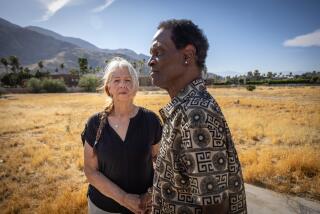Community Tunes In as Native Daughter Enters the Spotlight : Hometown: Morris, Okla., is a God-fearing, hard-working place. Many there are fierce backers of Hill. Others have doubts.
- Share via
MORRIS, OKLA. — The showdown between Judge Clarence Thomas and Prof. Anita Faye Hill hit Hill’s hometown this week like its 1984 tornado--a rip-roaring force of nature that shook the community to its roots and shoved it momentarily into a dizzying national spotlight.
All over town Friday, Morris tuned in to the Senate Judiciary Committee hearings. At Reynolds Hardware, men huddled before a wall of color TVs. In the school superintendent’s office, secretaries stopped typing. And outside town, Steve Woolsey pulled his pickup off the road and cranked up the radio.
“Nobody paid any attention to this judgeship before,” mused Woolsey, manager of the rural water district in northeastern Okmulgee County for 14 years. “It could have just come and gone and we wouldn’t have known nothing about it--if the Hill girl hadn’t popped up.”
Hill’s surfacing at the center of the sexual harassment storm shocked this tiny oil and farming town in northeastern Oklahoma, the God-fearing, law-abiding, minding-our-own-business kind of place that Hill left in 1973 as high school valedictorian and a Future Homemaker of America.
Hard-working, honest, keeping out of trouble: That’s how people in Morris describe the Hill family and, for that matter, themselves. They are people whose word “you can go to the bank on,” they say, the kind who show up in overalls after a disaster with a basket of food covered in a red-checked cloth.
“It’s a good community, a solid community, a reserved type of community,” said Morris Middle School Principal Derril Etchison, in a description that seemed to match many people’s impression of Hill herself. “Everybody minds their own business. But if somebody needs help, they’re there first.”
On Friday, “Faye” Hill was the talk of Morris (pop. 1,300).
Many professed themselves fierce partisans: They believed her instinctively, in their gut. “If Faye said he said it or did it, he did,” insisted Gordon Foster, the city superintendent, who grew up on a farm just north of where the Hills and their 13 children grew cotton, peanuts and oats.
Others had their doubts--men, in particular. Why had she waited so long? Maybe, they suggested, she was the proverbial “woman scorned.” Or, perhaps she went too far. Said K.R. McKinney, a rancher and oil producer, “Probably she spoke out when she probably should have kept her mouth shut.”
Even a few conspiracy theories buzzed through the mini-mart parking lots. “Honestly, I have a feeling that she may have been convinced to bring this up because of the way he may vote on abortion issues,” suggested one man who declined to give his name.
And in the end, even Hill partisans confessed some empathy for Thomas.
“He just denied everything,” said 81-year-old Bill Clark, a retired grocer, after Thomas’ opening statement. Clark declined to characterize Thomas’ testimony as a lie. “He just don’t want to admit it. I don’t blame him. I wouldn’t either.”
“If we were associated through work and flew somewhere for the weekend,” Woolsey, the water district manager, ventured, “I . . . as a male . . . it would depend on her mood or . . . body movement. You know what I’m talking about. I mean, we’re all human.”
The way people here tell it, Morris was an oil boom town in the 1930s and 1940s. As many as 5,000 people lived here, they say. Then came the oil bust of the early 1980s and the April, 1984, tornado that destroyed 70% of the town. It was a one-two punch from which Morris is still recovering.
Some grocery stores, cafes and video halls were never rebuilt. Even the high school football team, twice state champions, has seen better days. More than ever, social life now centers on the schools and the churches--Baptist, First Methodist, First Christian, Pentecostal.
At the high school Friday, a Mrs. Casey, the librarian, screened Hill’s testimony in private. Too explicit for current events class, Principal Jim Ledford then ruled. No big surprise, said Martha Foegelle, a 16-year-old junior: Last year, “Three Men and a Baby” was too racy for the school. “Bambi” aired instead.
Ledford calculated he had been interviewed 40 times in four days. On the receptionist’s desk, beside the peppermints, the 1973 high school yearbook lay open. Inside, Faye Hill smiled broadly--valedictorian, National Honor Society, Future Homemakers, Morris High School Pep Club.
“I really admire her,” said green-eyed Kristie Luchtel, 16. “Because for her to get out of this town and go to law school and succeed as she did is a big accomplishment. In a small town, we have small ideas. To go out in the world and be so successful, she would have to be extremely brave.”
Down the street, Roy King sat alone in his office at King’s Lone Tree Feed, hunkered down before a snowy television screen. A tall, tanned man with twinkling blue eyes, he rocked back and cackled at the bickering senators, jubilant: “She’s out-maneuvered those senators, really got them confused!”
“She’s a solid American, an honest person,” he said. “It’s the most ridiculous thing, trying to make her look like a villain. All these guys are . . . just upset someone’s turning over the apple cart. I admire a person like her who stands up for what they think is right.”
But over at the Shuttle Stop mini-market, Paul Pollard was less sure.
“I told those guys over here, could be a woman scorned,” he said, nodding across the street to the lumber yard. “Here’s a guy in line for a big position. . . . I think they’re gonna can him. I think she’s got him hung.”
At Reynolds hardware, the soaps had returned to the TVs. The big circus, as Gordon Foster called it, had adjourned for lunch. “Them guys go to work at 9, take lunch at 11, go back to work at 2 and leave at 4,” chuckled Bill Clark, a rare Democrat in a town that generally defers to “The President.”
Woolsey was lingering between the TVs and the humidifiers, feeling cynical.
“Well, we haven’t had anything exciting since the tornado came through,” he said. “So we’re really living it up. We’ve been on the national news. We need that at the coffee shop in the morning for conversation.
“But as far as really giving a damn, I don’t think we really do,” he ventured. “It’s just human nature, I guess. We have worse problems facing us on a daily basis than this. Most people don’t get involved unless it really affected them personally. Otherwise, they could really give a rip less.”
More to Read
Sign up for Essential California
The most important California stories and recommendations in your inbox every morning.
You may occasionally receive promotional content from the Los Angeles Times.












